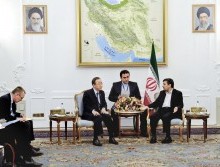With nuclear program discussions between Iran and the major world powers resuming in earnest last week, the Iranians are again playing hardball publicly. Their latest diplomatic volley is a rejection of any “special inspections” of their nuclear program, according to the speaker of the Iranian parliament.
Ali Larijani, in comments reported by the Fars News Agency, said that the same nuclear inspections approach used for most of the world’s nations should apply to Iran. Not surprisingly, the US feels differently considering Iran’s repeated violations of United Nations’ resolutions relating to their nuclear program.
The US has long been concerned that Iran is setting itself up for a run to nuclear weapons and is currently one of six major world powers negotiating a long-term deal with Iran that aims to put such concerns to rest.
Comments last week from a senior US official, released by the State Department, challenged the Iranian claim that the US is making “unreasonable demands” on Iran. “Let’s remember how we got here,” said the official. “We are in these talks because for years upon years, the international community—not just the United States, but through several UN Security Council resolutions—has said that Iran has not met its obligations under the Nuclear Non-Proliferation Treaty, that they have taken many steps, some in secret, to undermine those obligations.”
In light of that reality, the official noted that the Islamic Republic has a greater need to prove the peaceful nature of its nuclear program.
Said the official, “I do not think it is an excessive demand to say that any agreement must, in a verifiable and transparent manner, show that Iran’s program today and into the future is exclusively peaceful… Showing that to the world in verifiable ways seems to me quite doable.”
(By Joshua Spurlock, www.themideastupdate.com, September 21, 2014)

